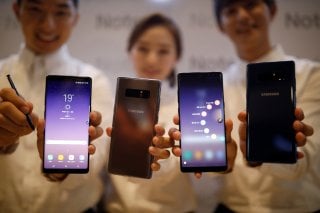How Smartphone Security Works in North Korea
A new report looks at the software that is used in North Korea to bypass the security authentications that have been put in place by the regime.
Smartphones in North Korea, it’s fair to say, don’t work the same they do in most of the Western world. Mobile phones were banned in North Korea until 2008. While 5G is rolling out in much of the world, North Korea is still on 3G, with recent reports indicating that a 4G deployment may soon be on the way.
Reuters wrote in 2019 that North Korea was evading sanctions and “using low-cost hardware imports to generate significant income for the regime.” Most North Korean phones, at the time, used Chinese batteries, Taiwanese semiconductors, and a version of the Android operating system.
Some mobile phone games have become popular in North Korea, with names like Taekwondo Competition and Badminton Competition, which are played over Bluetooth connections. Late last year, there were reports that North Korea was cracking down on Chinese-imported cell phones, with the regime even holding lectures “emphasizing that people who use Chinese-made mobile phones will face punishment.”
The Daily Mail, meanwhile, reported earlier this month that North Korea had passed a law cracking down on “perverted” language, with checks on people’s phones, to examine whether they had used such language in private messages, part of the enforcement.
Now, a new report looks at the software that is used in North Korea to bypass the security authentications that have been put in place by the regime.
This week, Daily NK published details about “Bidulgi 1.01,” a program used to “convert non-North Korean files on mobile phones.” Another program called Chammae is used for similar purposes. The Daily NK story includes photos of the software’s interface.
Both types of software run on Windows 7 and 10. The software helps bypass the software function, mandated by the regime, to delete unauthenticated files on users’ devices.
“North Korean authorities have installed two kinds of security authentications on smartphones: an independent authentication system and a “state authentication” system,” Daily NK said of the software. "Files authenticated by North Korean authorities with the state system run on all smartphones, while those authenticated with the independent one run only on the devices where they received the authentication.”
In addition, the installation guide for the Bidulgi software, also obtained by Daily NK, describes it as “a program that converts multimedia files like text, videos and music so you can use them on mobile devices such as mobile phones.” The manual also states that some files might not convert because they are “in use” or “state-approved,” and it says that the files may not work if the IMEI of their phone differs from that of the device where the file was first converted.
Stephen Silver, a technology writer for The National Interest, is a journalist, essayist and film critic, who is also a contributor to Philly Voice, Philadelphia Weekly, the Jewish Telegraphic Agency, Living Life Fearless, Backstage magazine, Broad Street Review and Splice Today. The co-founder of the Philadelphia Film Critics Circle, Stephen lives in suburban Philadelphia with his wife and two sons. Follow him on Twitter at @StephenSilver.
Image: Reuters.

